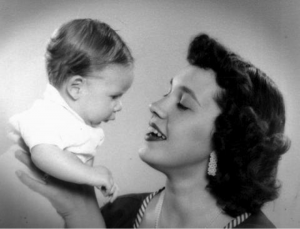Mom as Heroine in Her Story

Submitted by admin on Sat, 08/11/2012 – 09:58
The first year I was old enough to go to camp my mom was the church camp director. Just my luck. Sure I liked her company, but had been hoping to go somewhere without mommy. That was the breaks for a tween—desperately trying to grow up but not quite there.
My fears were unfounded because up there, she wasn’t the mother I knew. She was this fresh person with a playful, silly side. It may have been my first glimpse of her when she didn’t have to be the mom. A practical joke atmosphere developed and when she used the Port-o-John, two older girls locked her in. Ick! She laughed it off…and waited. When the girls went swimming she rifled through their duffle bags, retrieved their bras and strung them from the camp flagpole for a hundred girls to salute. I had never been prouder of my mother. As a conservative World War II-era lady she had a different sensibility than my Gen X friends and we found this mischievousness delightful.
It occurred to me that if she were not my mom—if we had been the same age—we would have been fast friends.
Mothers—at least good ones like mine—have a certain role. They provide, nurture, and yes, correct. They believe in our best potential and crinkle our noses when we are less. Perhaps we are conditioned to see them as apron-wearing, disapproving disciplinarians. They lecture. We roll our eyes and cross our arms with one hip jutting out like so.
When my dad passed away our roles shifted. I nurtured and she allowed herself to need me. We began writing their story and she opened her life completely, let herself be vulnerable.
Then, aside from the pleasure of spending time together, I received a surprise gift.
It was this: I got to see my mom through brand-new eyes. For their life to shine on the page, I first had to discover who they really were and it required peeling away layers. My dad was easier. For starters, death tends to cast a halo on people’s lives, shining on their best qualities. There was also the fact that he had always been the passionate one out front, a charismatic personality we all enjoyed watching. The less obvious fact was that she gave him that sparkle. She was the rock upon which his grand ideas became possible.
In this way I discovered her not as “the mom” but as the heroine in her own story, a courageous and even progressive leading lady. I now saw her as the glamorous young woman of black and white photos from before I was born.
I also saw her character arc unfold on the page. Sure I knew how Every Essential Element ended but until I began writing, I never knew all that she overcame in herself and the ways her strengths would triumph. Gaye Anderson began the story as a traditional 1950s girl-turned-housewife who later transcended stereotypies. She showed feminine strength and a pioneering spirit that will forever inspire me.
Perhaps in the next life we will enjoy an agelessness that transcends earthly generations and the boundaries of who we define as family or friends. Each will be both. But I don’t have to wait for that. Through this process, I get to enjoy it now.
What I would have missed to not know her this way? Since writing her story, I cannot count how many people have said, “I wish I had asked my parents/grandparents more questions while they were still here. I wish I had recorded their stories.” I will not have those regrets. I discovered her uniqueness while she still lived and breathed it. Because of this process she is now more than just my mother. She is more than my co-collaborator. She is my book’s heroine. She is my heroine.